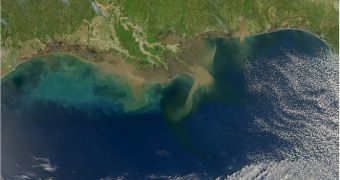In the aftermath of the Deepwater Horizon/BP oil spill that affected the Gulf of Mexico, NOAA closed down significant portions of the area for commercial and leisure fishing, so as to protect the health of the general public. Now, officials say that eight shrimp trawlers made runs into the forbidden waters.
The US National Oceanic and Atmospheric Administration (NOAA) is in charge of handling the clean-up and monitoring efforts in the portions of the Gulf that have been affected by the oil spill.
Agencies such as the Food and Drug Administration (FDA) and the Environmental Protection Agency (EPA) are also collaborating, as are officials in Gulf states. The decision to close or reopen sections of the closed waters for fishing is taken when all participants agree.
Usually, the group reopens an area when there is sufficient evidence that the local ecosystem is not being affected by crude or oil slicks, and after checking to see if animals at that particular location are fit for human consumption.
NOAA now says that no less than eight shrimp trawlers are suspected of having caught prey in the forbidden areas, and as such the agency sent their commanders notices of violation and assessment (NOVA).
An estimated 107,500 pounds of shrimp – the entire catch of all eight vessels – were confiscated, and then returned to the sea, to ensure that the products don't make their way to common households.
The ships were found navigating south of the Louisiana coast in June, July, August and November. They were all boarded by the United States Coast Guard (USGS), which carried out proper inspections of their haul.
“Throughout the oil spill event this summer, stringent enforcement of the closed areas was essential to ensuring both seafood safety and consumer confidence in Gulf seafood,” explains NOAA Fisheries Service assistant administrator Eric Schwaab.
“NOAA remains determined to protect the fishermen who follow the rules and the American public who eat the seafood they catch,” the official goes on to say.
“Our outreach and enforcement efforts worked, and most of the fishing industry readily complied with the closed areas resulting from the oil spill in order to ensure seafood safety,” adds expert Hal Robbins.
He is a special agent in charge of the southeast division of the NOAA Office of Law Enforcement. The OLE and the USCG work together in carrying out investigations on suspicious vessels in or around the closed ares.

 14 DAY TRIAL //
14 DAY TRIAL //